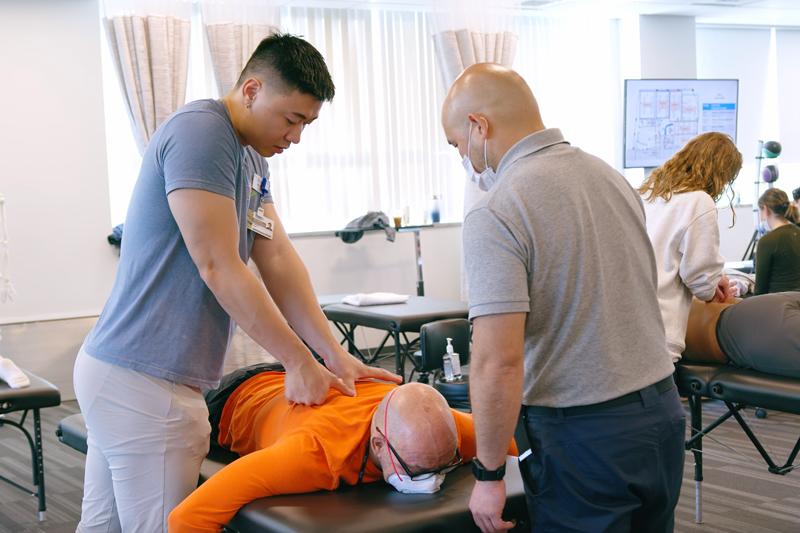7
semesters

Our core DPT curriculum, spans basic and applied sciences, leadership, critical inquiry, and patient management to form the foundation for your professional growth.
semesters
on-site clinical skills labs
weeks of clinical education
Our curriculum for physical therapy education is a dynamic blend of virtual coursework, on-site clinical skills labs, and hands-on clinical education, ensuring a holistic and integrated learning experience.
The didactic coursework intricately weaves the complexities of the body’s systems. It offers a holistic understanding crucial for patient care, preparing students to handle diverse health conditions across the lifespan and various healthcare settings. The coursework is delivered in two ways:
During the didactic portion, students will also actively participate in eight immersive on-site clinical skills labs, which take place where the student is enrolled (Boston, Phoenix, or Seattle). The labs serve as dynamic spaces for reinforcing hands-on skills, cultivating effective decision-making, and fostering collaboration among students and faculty. With an intimate 10:1 student-to-faculty ratio, these labs offer personalized guidance, ensuring that students receive the practical training necessary for their future roles in physical therapy.
Lab sessions range anywhere from 5-12 consecutive days in length, including weekends, depending on the semester courses, and attendance is mandatory.
In the last three semesters of the Tufts DPT program, students apply their learning during 31 weeks of clinical education in diverse settings nationwide. This immersive phase ensures students are well-versed in real-world patient care, exposed to various health conditions. To optimize this experience, students should be prepared for travel or relocation based on site availability.
Clinical education is a vital component of every DPT program, providing exposure to diverse practice settings and patients across the lifespan.
Under the guidance of experienced physical therapists, students immerse themselves in real clinical settings and work with real patients. This hands-on experience fosters the development of safe and effective practical skills in all aspects of patient care.
Beyond skill development, clinical environments emphasize teamwork and collaboration. Students become integral members of interprofessional health care teams, enhancing their communication skills, understanding of other professionals’ roles, and contribution to comprehensive patient management. These experiences equip graduates with the expertise needed for success in the dynamic field of physical therapy.
Below are support available across all Tufts DPT programs to better prepare our students for success on the exam:
The hybrid model combines flexible, interactive online coursework with eight on-site in person clinical skills labs and 31 weeks of clinical education experiences. This structure offers the flexibility to complete asynchronous content on your own schedule, while also requiring active participation in scheduled virtual classes and on-site labs. Tufts DPT programs are full-time programs to balance academic rigor with hands-on, engaging learning that fosters peer collaboration and strong faculty-student connections.
Not at Tufts. Our hybrid DPT program is intentionally designed to preserve—and in some cases—exceed the level of hands-on clinical training in traditional, brick-and-mortar programs. At Tufts DPT, students participate in eight on-site clinical skills labs, totaling over 500 hours of in-person, faculty-guided practice.
The academic rigor, clinical preparation, and comprehensive curriculum are not compromised in our hybrid format. Our program seamlessly blends high-quality asynchronous coursework with interactive synchronous session, structured, in-person skills labs, and clinical education experiences. This approach offers increased flexibility for students managing personal, family, or other concurrent responsibilities, while also supporting a wide range of learning preferences. For many, our hybrid format opens the door to a DPT education they may not have thought possible—without compromising the depth or quality of training required for professional success.
Online coursework includes both asynchronous learning (pre-recorded lectures, readings, and assignments) and synchronous sessions (live, faculty-led discussions, case-based learning, and group activities). This dual format can provide flexibility while maintaining engagement. In our program, students can anticipate, at minimum, dedicating 50-60 hours/week to attending virtual classes, completing asynchronous work, and collaborating with teammates or faculty. See curriculum details for more information.
Yes. Tufts DPT emphasizes faculty accessibility. You’ll engage with instructors weekly in live sessions, office hours, and during on-site clinical skills labs. Our faculty also serve as academic coaches and mentors, offering consistent support throughout the program.
Courses are taught by core faculty with extensive clinical, research, and teaching experience. With a 1:10 faculty-to-student ratio, we ensure personalized attention. Our team-teaching model ensures students learn from multiple subject-matter experts, with associated faculty contributing to on-site clinical skills lab immersions to broaden clinical exposure.
Students complete 31 weeks of full-time clinical education across three clinical placements in diverse healthcare settings nationwide. This structure provides exposure to different patient populations and practice environments.